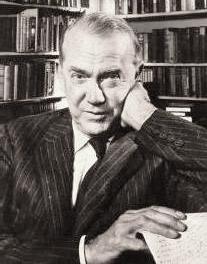Today, Ellyn von Huben introduces this month’s Word on Fire Book Club selection, Graham Greene’s “The End of the Affair.” Be sure to read Ellyn’s introduction and pick up your copy of the book.
Here is where I am jumping into the Word on Fire Book Club with both feet. It’s been fun so far; favorite authors, favorite stories. And now I am introducing an author I have always been compelled to hold in high regard by virtue of his reputation, though I don’t think I had actually read anything that he had written. I introduce to you, Graham Greene (1904-1991), British, cerebral, a convert to Catholicism, and another addition to the ranks of “bad Catholics.” (Some books caved in over the week-end – that’s what happens when I decide to dust – and I found that I did own his masterpiece “The Power and the Glory”) so that has been bumped to the must-read shelf. But until the Book Club decided on Greene I knew very, very little about him. I knew he wrote a book call “Travels with My Aunt” that I had somewhere along the line confused and conflated “Travels with Charley” and “Auntie Mame”. Sort of a musical road trip with an eccentric aunt – as played by Angela Lansbury – and her loyal poodle. Indeed, I was sorely in need of some education about this literary treasure.
Reading a bit of biographical material on Greene makes me take an instant liking to him. And not just as one convert to another; but as a convert who has had her own rocky moments. He was a convert, a writer of some decidedly Catholic fiction – which I would consider to be something along the lines of “outsider art” in the Protestant atmosphere of England. He was often depressed (suffering what now is considered to be bipolar disorder) and had attempted suicide several times in his youth. He went through some later years as a ‘lapsed Catholic’ but returned to the Church near the end of his life. The religion that saturates his work is not light and flighty; it is intense food for contemplation. While doing some online research I found this quote which defines Greene quite well: In both life and literature however, Greene was a poor advertisement for the familiar argument of religion being a solace in life, the “heart in a heartless world”. Yes, there is no overt treacle, but I would invite one to dig a little deeper.
Those interested in looking at more of this prolific author’s influence might want to look at IMDB – being aware that there is also a contemporary actor by the same name – and see how many of his works have been made into movies (our book club selection has been filmed twice) and how many screen plays and teleplays he has written.
“The End of the Affair” is our introduction to Graham Greene. And what an introduction it is. I don’t want to give out many spoilers, but I must say that this is a tremendous story that only a writer of Greene’s genius could create. It is a book of very adult themes (adulterous sex, for one) and miracles. Greene writes with such spare and precise, polite, British-type restraint that a none-too-cautious reader could easily miss the harsh storyline. A contemporary hack could flesh (and I use that word in its various definitions) out the same storyline to be four times longer, much sexier, a little bit ‘pop spiritual” and an instant bestseller. Or a writer with more sugar-coated piety could downplay the lust in question and bring the story to a quick happy ending right around Greene’s first pivotal jolt in the story, making it a suitable ‘women’s novel’ in Christian bookstores.
I hope everyone will grab a copy and be drawn into this entrancing story of lust, faith, questioning…and miracles. A story that could only be told by Graham Greene.
